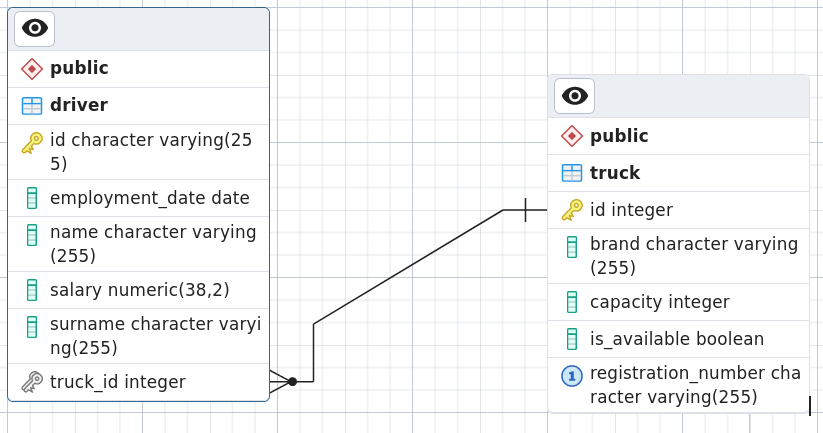Recycling Exercise
1. Create a new JPA project using Maven
2. Create JPA entities for the database
- use diagram below as a reference
- the two entities should be called
DriverandWasteTruck - both entities should be placed in a package called
entities - the HibernateConfig class should be placed in a package called
config - for the salary use the type BigDecimal
- for the date use the type LocalDate
- the driver constructor should only take the name, surname and salary as a parameter
- the truck constructor should only take the brand, capacity and registration number as a parameter

3. Validate the driver id
- Create a method in the Driver class to generate a String id with the following constrains
- The id for the driver should be a string with the format
ddMMyy-XX-XXXL. ddMMyyis the date of employment, (Date: 2023-08-26 -> String: 230826)XXis the first letters of the name and of the surname (Name: John Doe -> String: JD)XXXis a random number between 100 and 999Lis the last letter of the surname (Surname: Doe -> String: E)- Use this method below to validate the id of the Driver class
public Boolean validateDriverId(String driverId) {
return driverId.matches("[0-9][0-9][0-9][0-9][0-9][0-9]-[A-Z][A-Z]-[0-9][0-9][0-9][A-Z]");
}
- The driver id and the employment date should be set in a @PrePersist annotated method
5. Create DAO interfaces for the entities
Create a new package called daos and add two interfaces called IDriverDAO and IWasteTruckDAO and add the following code to their interface
// Driver
void saveDriver(String name, String surname, BigDecimal salary);
Driver getDriverById(String id);
Driver updateDriver(Driver driver);
void deleteDriver(String id);
List<Driver> findAllDriversEmployedAtTheSameYear(String year);
List<Driver> fetchAllDriversWithSalaryGreaterThan10000();
double fetchHighestSalary();
List<String> fetchFirstNameOfAllDrivers();
long calculateNumberOfDrivers();
Driver fetchDriverWithHighestSalary();
// WasteTruck
void saveWasteTruck(String brand, String registrationNumber, int capacity);
WasteTruck getWasteTruckById(int id);
void setWasteTruckAvailable(WasteTruck wasteTruck, boolean available);
void deleteWasteTruck(int id);
void addDriverToWasteTruck(WasteTruck wasteTruck, Driver driver);
void removeDriverFromWasteTruck(WasteTruck wasteTruck, String id);
List<WasteTruck> getAllAvailableTrucks();
6. Implement the DAO interfaces
Create a daos/impl package and implementent the interfaces as DriverDAO and WasteTruckDAO classes
7. Populate data
- Use this sql script to populate the database
-- Add 5 rows to the "truck" table
INSERT INTO truck (id, brand, capacity, is_available, registration_number)
VALUES
(1, 'Volvo', 8000, true, 'A123-45-B6'),
(2, 'Ford', 12000, false, 'C678-90-D1'),
(3, 'Mercedes', 15000, true, 'E234-56-F7'),
(4, 'BMW', 10000, false, 'G789-01-H2'),
(5, 'Chevrolet', 17000, false, 'I345-67-J8');
-- Add 10 rows to the "driver" table
INSERT INTO driver (id, employment_date, name, surname, salary, truck_id)
VALUES
('230826-BD-398E', '2023-08-26', 'John', 'Doe', 12550, 1),
('200512-AD-786M', '1995-05-12', 'Alice', 'Smith', 18550, 2),
('211104-CE-572S', '1996-11-04', 'Charlie', 'Evans', 21800, 3),
('201217-GK-123D', '1997-12-17', 'Grace', 'Kelly', 52000, 4),
('220609-MP-456H', '1998-06-09', 'Michael', 'Parker', 31200, 5),
('200821-FR-892L', '1999-08-21', 'Frank', 'Roberts', 28500, 4),
('230531-WT-642B', '2023-05-31', 'William', 'Turner', 65800, 3),
('230304-LH-718R', '2023-03-04', 'Laura', 'Harris', 8500, 3),
('230925-SJ-599M', '2023-09-25', 'Sarah', 'Johnson', 16500, 5),
('211128-PT-347S', '2000-11-28', 'Peter', 'Taylor', 33000, 1);
8. Create a main method
In the root of the project, create a Main class with a main method that runs a few of your DAO methods to test that they work. Save your time for the next exercise. It’s only to get started.
9. Create integration tests
This is a big deal. You need to test all the methods in the DAO classes using JUnit.
Use this integration test tutorial to help you get going.